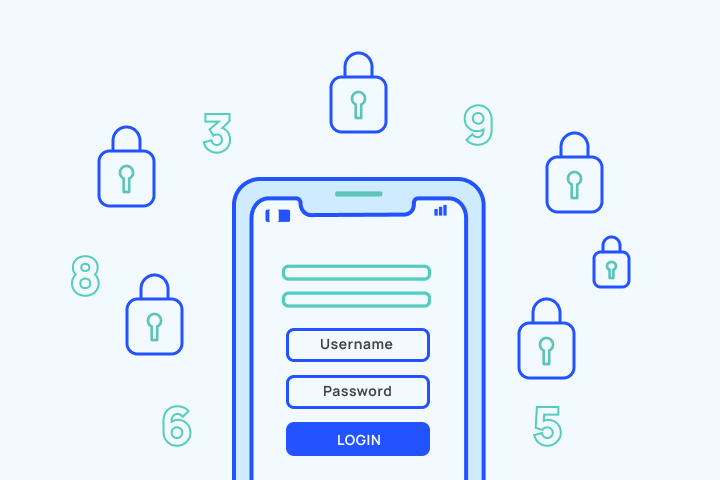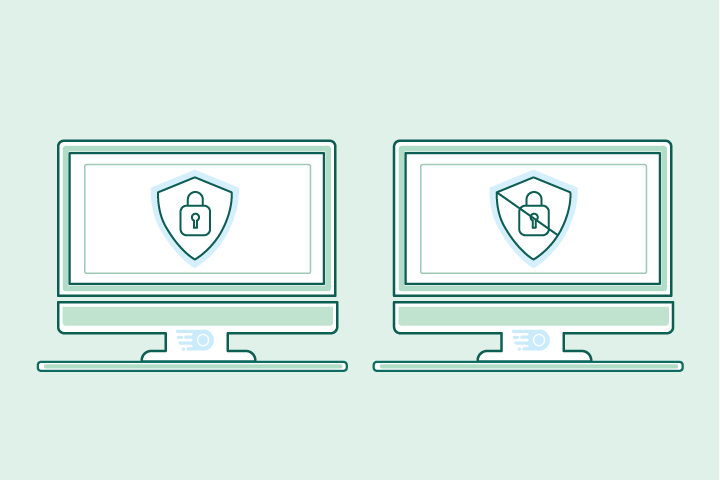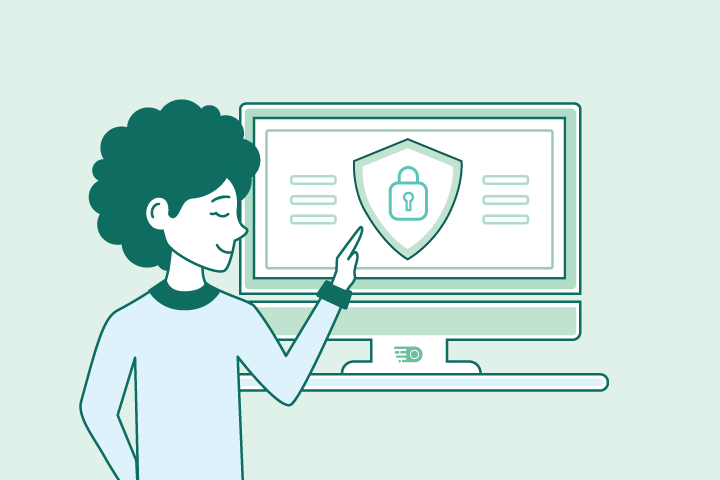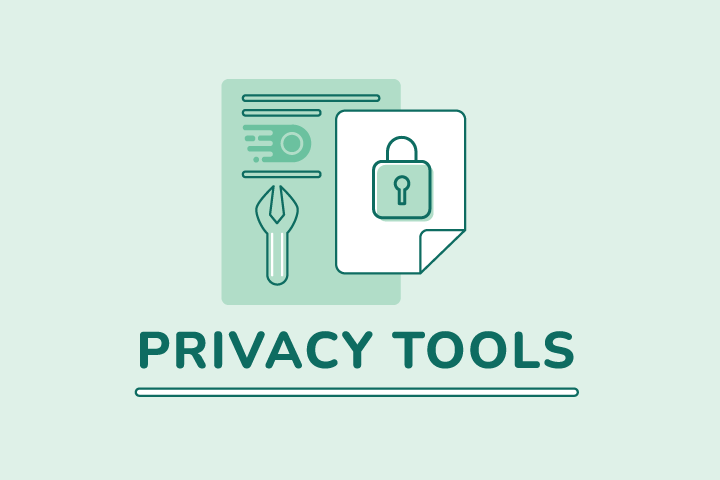5 Best Password Managers of 2024

HighSpeedOptions prides itself on providing honest, quality content. While we may be compensated when you make a purchase through links on our site, all opinions are our own. Here's how we make money.
Table of Contents
Remembering passwords can be a struggle given the number of places we have to log in online every day. Resorting to easy-to-remember passwords, while helpful, is not a good solution and could compromise your online security and privacy.
Password managers make it easy to maintain strong online security without having to remember dozens of complex passwords. They can create strong and unique passwords for all of your online accounts, and store them in a secure location. Once you need to log in, the password manager will autofill your credentials when you need them.
Check out our list of the 5 best password managers on the market to determine which suits your needs.
The Best Password Managers
Bitwarden – Best for Security
Known for its security and capable free tier, Bitwarden tops our list as the most secure password manager on the market. While a few advanced features are locked behind a paywall, the bulk of Bitwarden’s service can be enjoyed from its free plan, too. Although, for just $10 per year, you can get all Bitwarden has to offer at a fraction of what you’d pay with other premium services.
Bitwarden not only stores and saves your passwords, but it also generates and updates them as needed. It creates routine password audits and provides a password generator, so you can stay on top of your password security. Both free and premium versions also come with unlimited device connections, device types, and vault items, so you can protect as many passwords, notes, credit cards, and identities as you need with a single account.
As far as compatibility goes, it’s one of the best. Users can install and deploy the Bitwarden software on any Android, iOS, Linux, macOS, or Windows machine as well as most web browsers including Google Chrome, Mozilla Firefox, Opera, Microsoft Edge, Apple Safari, Vivaldi, Brave, and even Tor Browser.
Because Bitwarden is open source, it is continually audited by thousands of users and staff. This checks and balances approach helps solve for any potential security vulnerabilities or updates needed for the best user experience. It also complies with all Privacy Shield, GDPR, and CCPA regulations, and uses military-grade AES 256-bit encryption to protect user information.
Premium users also get advanced features including two-factor authentication (2FA) methods such as biometric logins, TOTP authentication, and physical secret keys like YubiKey/Duo. If you want to go further, Bitwarden even supports Universal 2nd Factor (U2F) authentication, which is a method that uses one key for multiple accounts – elevating the security provided by 2FA.
Pros
Capable free plans available
Industry-low pricing on Premium plans
Open-source software
Zero-knowledge encryption
Unlimited devices + syncing
Unlimited device types
Unlimited storage
Free cloud hosting
Encrypted export option
2FA methods
Cons
YubiKey, U2F, and Duo support locked behind a paywall
No TOTP with the free plan
Learning curve for password management beginners
Basic user interface
LastPass – Best for Beginners
It’s an easy process to set up LastPass after creating an account and downloading it to the browser or device of your choice. Users have three different subscription options: 1) a free plan, 2) a single Premium plan, or 3) a Family Premium plan with up to 6 licenses.
LastPass has one of the most user-friendly experiences, which is great for entry-level users. It’s also compatible with all major web browsers including Chrome, Firefox, Safari, Edge, and Opera as well as operating systems such as Android, iOS, Linux, macOS, and Windows.
Settings are easy to customize to fit your needs and workflow. The LastPass dashboard includes tabs for password vaults, secure notes, addresses, credit cards, and even bank account credentials. The included Security Dashboard provides standard password auditing, so your logins are always updated and secure. You can also share passwords with other LastPass members if you’d like.
LastPass uses AES 256-bit ciphering to encrypt passwords end-to-end. It also offers time-based one-time password (TOTP) authentication (think push notifications on your smartphone) via methods such as Microsoft Authenticator, Google Authenticator, Grid, Toopher, and Duo Security. Also, if you’re a premium user, you have the option to enable a physical security key. This could be a biometric login via a fingerprint and smart card or a YubiKey USB drive.
The free tier offers a lot, but it does have a few limitations. Namely, users on the free plan can only use LastPass on a single device type. This means that you can only store passwords across computers (i.e. all browsers running on desktops and laptops) or mobile (i.e. tablets, phones, and smartwatches). It also can’t share files with multiple users at once and caps your storage. All of these features are included with a premium plan, which is well worth the upgrade.
Pros
Robust free plan
- Free 30-day Premium trial
Competitively priced
Straightforward interface
- Extensive 2FA options
Up to 6 licenses per family plan
Unlimited storage with paid plans
Yubikey support on premium plans
Cons
Free plan limited to one device connection at a time
Limited storage on the free plan
Occasional server interruptions require multiple login attempts
Form-fill feature sometimes finicky
Not easy to import passwords
NordPass – Best User Experience
NordPass is an extension of its more popular product, NordVPN. While its one-month plan is pricier than most password managers, NordPass gives users multiple options to test out its platform before committing to a long-term plan – which is significantly cheaper and competitively priced.
NordPass immediately checks off the must-have boxes. Both its free and paid plans come with unlimited storage, a sleek interface, and compatibility with all major web browsers as well as Windows, macOS, Linux, Android, and iOS systems. However, while NordPass supports the Chrome browser extension, it does not support Chrome OS (Chromebooks).
NordPass makes importing passwords and files seamless. Within the app, there are guides and plugins to help you consolidate your account logins. You can also easily share passwords with other Premium members.
NordPass uses standard AES 256-bit encryption, employs routine password checks, and offers multi-factor authentication (MFA) methods. Biometric logins and time-based one-time password (TOTP) authentication are typically what you think of for MFA – and NordPass does offer those.
The best password managers also come with physical security key support, which NordPass recently added in the summer of 2021. Furthermore, NordPass runs on a zero-knowledge architecture, so not even it knows what you store in your password vault.
Pros
Free basic plan available
Free 7-day Premium trial
30-day money-back guarantee
- Password sharing options
- Sleek interface across all devices
Multi-Factor Authentication
New physical secret key support
- Earn credit if you refer a friend
Stores passwords, notes, and credit card information
Audited by Cure53, an independent security firm
Cons
- Expensive one-month plan
Free plan limited to one device connection at a time
Lacks digital inheritance
Only premium users can create shared folders
No family plans available
1Password – Best for Families
1Password is ideal for families looking for a way to share passwords at an affordable cost. It requires you to enter a credit card upon sign-up, but you can do the 14-day trial and then cancel within that window to avoid charges.
1Password is extremely easy to use. It provides multiple setup guides to help you download the app on your devices and transfer passwords from other password managers like Dashlane, RoboForm, LastPass, and Chrome. If you’re on a family plan, this also makes it easier to expand your password vault. Rather than manually typing out your credentials, you can transfer logins with a few clicks.
Offering layers of encryption, 1Password utilizes end-to-end AES 256-bit encryption and true 2FA across all devices as well as biometric login support on mobile devices. If you even suspect an account may be breached, 1Password comes with a Watchtower feature that alerts users to any weak logins, compromised websites, and expiring passwords. It does not store your master vault key. 1Password provides an “Emergency Kit” for your records instead. At sign-up, it requires you to download a copy in case you ever need to recover your account.
1Password also offers two unique security features including password-authenticated key exchange (PAKE) and Travel Mode. PAKE is an encryption protocol where two or more people have a shared password known as a cryptographic key (1Password calls it a Secret Key). Each person holds a specific part of the 36-character password so that only together can they unlock a 1Password vault.
Travel Mode is a feature that temporarily deletes entire password vaults from your device when toggled on. This way your devices (and your personal information) can’t be compromised when you travel. It’s another great feature for families to have when traveling. Your kids may lose their phones on a trip, but with Travel Mode on, you won’t have to worry about them (read: you) losing personal data, too.
To top it off, 1Password plans come with unlimited storage, unlimited device connections, and the ability to store secure notes in your account.
Pros
Free 14-day trial
- PAKE encryption protocol
Compatible with Apple, Windows, and Chromebooks devices
- Compatible with Linux, Android, iOS, macOS, and Windows operating systems
Browser extensions for Chrome, Firefox, Safari, Edge, and Brave
Family plan available for password sharing
Biometric login support including facial recognition and fingerprint reading
24/7 customer support
AKE cryptographic key option
Travel Mode feature prevents prying eyes from accessing your logins
Intuitive form capture feature
Cons
No long-term free version
No individual recovery option, aside from manually printed Emergency Kit or a family account member
Automatic lock after 10 mins (though this can be adjusted in settings)
Basic, outdated desktop application
Weak mobile app experience
Norton Password Manager – Best Free Service
Easy-to-use and completely free, Norton Password Manager is excellent for users on a budget or new to password managers. It provides all the basic password management functions you’d hope for while lacking just a few nice-to-haves. Users can download the software for free online or get it bundled with any Norton 360 internet security plan below.
Norton Password Manager uses military-grade security measures including AES 256-bit encryption, basic two-factor authentication (in the form of push notifications), a zero-knowledge policy, and an autochange feature. Autochange lets a user update their password stored on a website with just one click, automatically completing all the backend steps normally required to change a password.
And, the only way to access passwords in your account is with your vault master password, which is never stored or sent anywhere. Norton warns users multiple times at sign-up that the vault password is not recoverable. This zero-knowledge policy can either be a pro or con depending on how you view it.
This service is largely web-based, which makes it very easy to start using. You can sync passwords across all of your Android, iOS, and Windows devices. And you can download its app on popular browser extensions for Chrome, Edge, Firefox, and Internet Explorer. If you currently already have a password manager including LastPass, 1Password, or Dashlane, you’re able to import those stored passwords into a Norton Password Manager account pretty easily. Norton also provides unlimited password storage, so you don’t have to worry about running out of space.
A few advanced options Norton Password Manager is lacking include password sharing, digital inheritance (i.e. family plans for shared access), 2FA for desktops, and a built-in time-based one-time password (TOTP) authentication. However, for a free password manager, Norton covers all its bases – and does it well.
Pros
100% free
Unlimited password storage
Automatic password change
Syncs all passwords across Windows, iOS, and Android devices
AES 256-bit encryption
Biometric two-factor authentication available on mobile devices
Password vault auditing tool
Password generator
Cons
No account recovery options
No password sharing
No digital inheritance
No advnaced two-factor authentication
No built-in TOTP authenticator
No More Jotting It Down
The days of writing passwords down on sticky notes or settling for “password123” at sign-ups are over. With cyberattacks on the rise, your online accounts – be it financial, retail, or leisure – are all ripe for the taking. Hackers won’t hesitate to test your password vulnerabilities, so it’s important to safeguard your personal information at all times, and password managers help simplify the process.
Find providers in your area

Table of Contents





